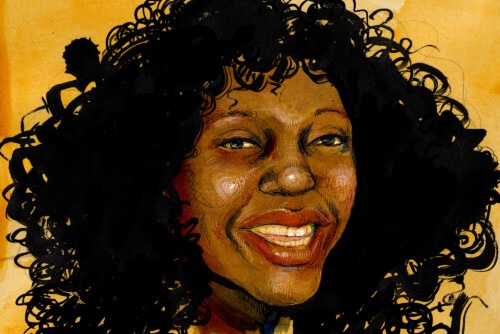A response to the panel “Building and Rebuilding Societies in Africa” at the conference Activism and the Academy: Celebrating 40 Years of Feminist Scholarship and Action. Watch the video here:
Four years ago, BCRW began an initiative to build on the deep research and scholar-activist interests of Barnard faculty engaged in transnational feminist work. The transnational feminisms project is an effort to build connections with scholars and activists in different regions of the world through collaborative and mutually generative work. As with BCRW’s local, New York City, activist-scholar projects, the transnational feminisms project aims to create long-term partnerships with individuals and organizations working at the intersections of gender and other social justice issues.
It is no small feat to engage in transnational collaborations. Feminist discourses and projects often do the work of shoring up alibis for war, invasion, occupation, intervention, and old and new forms of colonial relations. 1 As a result, the temptation is great to abstain from transnational partnerships, fearing their cooptation by and complicity in forces of violence. The global ascendancy of a particular kind of feminism, infused with neoliberalism, militarized humanitarianism, and colonial modes of relationality, has not only elided the multiplicities of different kinds of feminism, but has exacerbated relations of power and inequality. 2 And yet, as many feminists have long argued 3 , political and intellectual projects and affiliations across multiple differences and shared struggles have the potential to shift and challenge power, and create alternative worlds, including a world in which all women could live “in dignity, autonomy, and equality.” 4 With this ethos in mind, BCRW has spent the last four years integrating a transnational scope into its research, programming, and projects. The 40th anniversary conference in the fall of 2011 showcased multiple panels with a transnational focus. The panel, “Building and Rebuilding Societies in Africa,” emerged out of a desire for engagement with scholars, activists, and projects that pointed towards long-term collaboration and shared knowledge production. The panelists bring a feminist analysis to the political, social, and economic forces shaping contemporary global social relations, and locate feminist power and agency in multiple locations.
The panel was organized to link the changes across North Africa coinciding with the 2011 “Arab uprisings” to other political and social movements and changes across the continent. At the last minute, scheduled panelist Christine Karumba from Women for Women International in the Democratic Republic of the Congo was denied a visa by the U.S. State Department, making visible the ways in which state power can determine who does and does not participate in transnational gatherings and discussions. Despite the absence of Karumba, panelists from Northern and Southern Africa engaged in lively discussions about the difficulties and dilemmas, yet absolute necessity, of critical feminist analyses in movements for legal reform and political power.
Addressing the uprising of 2011 in Egypt, Rabab El Mahdi’s critical assessment of the obsession in various Western media with the visibility/invisibility of women in Tahrir Square links contemporary neocolonial discourses to those of the past. This hyper-focus on the “woman question” is one of the ways that British colonialists consolidated their power in 19th century Egypt. As scholars argue 5 , colonial discourse worked to disavow actual forms of Egyptian women’s agency, while over-determining the meaning of women’s visibility/invisibility in public space. These older colonial discourses are easily resuscitated in analyses of contemporary struggles.
As El Mahdi points out, in the social actions that led to Tahrir Square, feminist ideas and practices were implemented by women in sites ignored by more mainstream feminist organizations within Egypt, by European and American feminists and by the mainstream media. El Mahdi asserts that women in Egypt’s labor movement, for instance, have been key organizers for years, prompting them to ask, “Where are the men?” Moreover, she points out, women in Islamist organizations are strong and powerful, but not deemed “feminist enough” by more traditional feminist organizations. As El Mahdi asks, had the uprisings of 2011 been in Europe, would media have obsessed about the role of women?
The complex gender politics of the Arab uprisings raised questions for those on the panel working in South Africa. As Penelope Andrews and Jane Bennett argue, the end of apartheid brought about an amazing legal revolution in South Africa, which produced a constitution reflecting the new society’s commitment to gender justice, as one among many forms of social justice. However, legal reforms have not, on their own terms, assured society-wide gender equality. Echoing the claims of keynote speaker Mamphela Ramphele, the panelists remind us of the limits of legal change without massive structural change and redistribution of resources. In South Africa, as in Egypt, or the U.S., the acquisition of legal rights while massive economic inequality is sustained will skew access to power and resources and interfere with the very possibility of realizing the legal rights of poor and working-class people.
The relationship between rights and resources, and between equality and justice, are themes critically important to the work of BCRW—locally, nationally, and transnationally. The transnational feminisms project builds collaborations with scholars and activists, like those working in Africa, who are bringing a vision of gender justice, beyond the narrow implementation of legal rights, to their work in multiple kinds of movements, like the movement for justice in domestic work, or struggles for quality health care and housing. The global forces of neoliberalism and militarism necessitate a global analysis and response. A transnational feminist politics embeds gender justice within economic and political struggles, linking rights and resources, legal and symbolic recognition to material gains and power.
BCRW’s transnational feminisms project looks beyond dominant global discourses of “women’s empowerment” to the spaces deemed “not feminist enough,” to those spaces deemed overly “religious,” to those understood as about “other” issues, like labor and nationalism, and to those that are feminist in a different way. 6 It is such spaces that provide the possibilities for long-term, truly transformative change.
- For documentation of the long history of writing about these challenges for feminism, see, for example, Gayatri Chakravorty Spivak, “Can the Subaltern Speak?” in Marxism and the Interpretation of Culture, ed. Lawrence Grossberg and Cary Nelson, eds, 271-313. Urbana: University of Illinois Press, 1988; Chandra Talpade Mohanty, “Under Western Eyes: Feminist Scholarship and Colonial Discourses,” in Third World Women and the Politics of Feminism, ed. Chandra Talpade Mohanty, Ann Russo, & Lourdes Torres, eds. 51-80. Bloomington: Indiana University Press, 1991. Marnia Lazreg, “Feminism and Difference: The Perils of Writing as a Woman on Women in Algeria,” Feminist Studies, Vol. 14, No 1, 1988: 81-107.[↑]
- See, Josehpine Ho, “Is Global Governance Bad for East Asian Queers?” GLQ: A Journal of Lesbian and Gay Studies, (2008) Vol. 14, No. 4; Elizabeth Bernstein, “Militarized Humanitarianism Meets Carceral Feminism: The Politics of Sex, Rights, and Freedom in Contemporary Antitrafficking Campaigns,” Signs: Journal of Women in Culture and Society (2010), vol. 36, no. 1; Janet Halley, et. al. “From the International to the Local In Feminist Legal Responses to Rape, Prostitution/Sex Work, and Sex Trafficking: Four Studies in Contemporary Governance Feminism,” Harvard Journal of Law & Gender (2006): Vol. 29.[↑]
- See, for instance: Lorde, Audre. Sister Outsider. New York: Ten Speed Press, 1984; Mohanty, Chandra. Feminism without Borders. Durham: Duke University Press, 2003; and Grewal, Inderpal and Caren Kaplan, editors. Scattered Hegemonies: Feminism, Postmodernity, and Transnational Feminist Practices. Minneapolis: University of Minnesota Press, 1994.[↑]
- BCRW Mission Statement, http://bcrw.barnard.edu/about[↑]
- Ahmed, Leila. Women and Gender in Islam. New Haven: Yale University Press, 1993. Baron, Beth. Egypt as a Woman: Nationalism, Gender, and Politics. Berkeley: University of California Press, 2007. [↑]
- For an analysis of how “empowerment” works in India see Aradhana Sharma, Logics of Empowerment: Development, Gender and Governance in Neoliberal India. Minneapolis: University of Minnesota Press, 2008.[↑]



